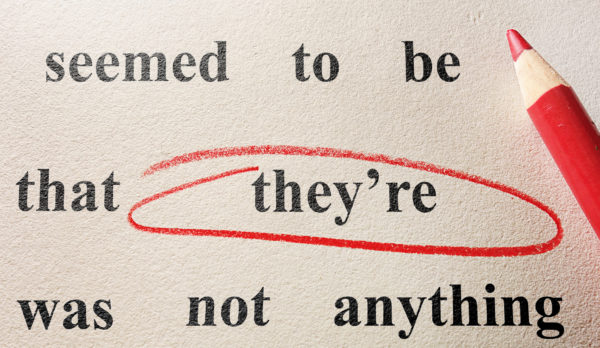Nobody’s perfect, and we’ve made these errors too. But, in the digital age, poor grammar is an instant chip on your credibility. Bookmark this and reference back when you’re unsure!

- Your/You’re – “Your” is a possessive pronoun, as in “your car” or “your desk“. “You’re” is a contraction of “you are“. For example: “You’re screwing up your writing by using ‘your’ when you mean ‘you are.’”
- There/Their/They’re – “There” is a location. “Their” is something that a group possesses – “their team.” “They’re” is a contraction of “they are“. You may need to slow down your typing to talk this one out to be sure you’ve chosen the right word!
- Historic/Historical – “Historic” means an important event that is happening right now, or will happen such as “Tom’s market announces a historic sale on custom fruit baskets this weekend.”Historical” is something that happened in the past.
- Lay/Lie – Lay requires a direct object and lie does not. You lie down on the sofa (no direct object), but you lay the book down on the table (the book is the direct object). This is in the present tense, where you are talking about doing something now: you lie down on the sofa, and you lay down a book.
- Fewer/Less – If you can count it, use “fewer” to describe. If you cannot, use “less“. Kari has less incentive to come in early since the office cappuccino machine is down.
- Apostrophe – You only use an apostrophe in for contractions (i.e. don’t, can’t, isn’t, etc.) or to show possession. Never to show a plural – we see this often in talking about a family – they’re the Damrons not the Damron’s.
- Loose/Lose – Please proof carefully for this one. If your hold on grammar is to loose, you might lose clients because you appear unprofessional.
- Affect/Effect – “Affect” is a verb, as in: “Your ability to communicate clearly will affect your clients.”Effect” is primarily a noun, as in: “The effect of poor communication has been well documented in the demise of relationships.”
- Then/Than – As a general rule, “than” should be used when making a comparison such a: “This is bigger than that.” “Then” applies to all other instances as it has a variety of meanings including “in addition to” and “at a point in time.”
- Its/It’s – “Its” is a possessive pronoun as in: “That dog dropped its toy for you throw again.” “It’s” is a contraction of “it is” or “it has”, so try saying your sentence out loud using “it is” before you add that apostrophe!